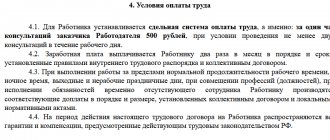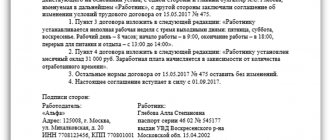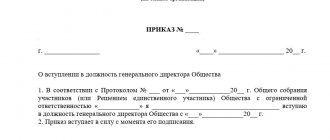Probation period: what is it?
The probationary period is the time during which a citizen is checked for suitability for the position held. However, there are some points that are important to pay attention to in advance:
- This time is set only for employees who have not previously worked for the company. It is impossible to apply similar rules to those who have previously received a position and are now being transferred to a higher one.
- Tests are also prescribed before the citizen begins his immediate duties. At this point, it is worth completing one of the documents to resolve the issue. The condition is included in the main employment agreement or an additional one is drawn up. Otherwise, the condition itself loses its legal force.
- In addition to the above papers, the condition must be written down in the order associated with admission to the position.
- The employee must sign each document to confirm that he has read the information. Such notes are not required in the work book.
The legislation states that during testing, citizens are subject to standard legislation currently in force. Taking into account this rule, the test cannot be considered as a reason for reducing remuneration for work. Moreover, in the absence of additional provisions indicating a special calculation of wages.
To receive your first annual paid leave, you must work for one manager for at least 6 months. Only the time of actual work is included in such length of service. The probationary period refers to the time when the employee is subject to all standard regulations.
https://youtu.be/hxOlo28UbY0
Design rules
How to draw up an employment contract with a probationary period?
Having informed the potential full-time employee of the decision to assign him a probationary period and having received his consent, the employer enters the corresponding clause in the TD.
A similar clause is formulated something like this:
Subject of the agreement:
- An employee is hired as a work producer for an indefinite period.
- To begin performing labor functions on January 25, 2020.
- This agreement establishes a probationary period of 2 (two) months.
There is another option.
To have a more accurate idea of how a probationary period is drawn up, we recommend that you read the article “Rules for registration of a probationary period in a contract, work book and other documents”
Applications
The clause on the trial period can be included in the same wording, only in the appendix to the contract. The key point here is the date of signing by both parties, which must correspond to the date of signing of the main document, and only before the new employee began his duties .
Signing an application is usually practiced in small companies , in which a standard form of TD has been developed, without introducing a condition for establishing a verification period, and the application is drawn up if necessary.
In case of a fixed-term contract
Is there a probationary period for a fixed-term employment contract?
Yes, a fixed-term employment contract may well contain a condition on checking the employee’s competence, if the applicant does not object and agrees to sign a TD with such a clause or an appendix to the TD.
The general requirements of the law are subject to the same requirements as for open-ended TD. The only limitation is the length of the verification period for temporary or seasonal workers whose contract does not exceed 2-6 months . For them, the verification period cannot be longer than 2 weeks.
How long does the test take?
3 months is the maximum period for testing. But there are individuals who allow this time to be increased, up to six months. Here are some of the positions that allow such changes:
- Those who head separate divisions or branches.
- Chief accountant, together with deputy.
- The immediate manager of the company, his deputy.
2 weeks is the maximum test duration for those whose main contract is valid for no more than 2-4 months.
Labor legislation does not establish any lower limits for the corresponding values. In this sense, the employer and subordinate can come to an agreement, and then record the value in one of the documents, the execution of which accompanies the test. An exception is for legislative requirements in relation to civil servants.
How long does the test last?
The probationary period is appointed within the time limits established by law. The Labor Code provides for the right to enter into fixed-term and open-ended contracts:
- If the contract is drawn up for a period of 2 to 6 months, then the trial period can be set to a period of up to 2 weeks.
- If the duration of the employment relationship exceeds 6 months, then the trial period can be up to 3 months.
- Longer test period - up to 6 months. Can be installed for persons applying for a management position (chief, deputy, chief accountant, head of a company department).
Thus, the duration of the employment contract is not an obstacle to installing the test; only its terms are limited.
How is the information reflected in the contract?
Article 57 of the Labor Code of the Russian Federation helps to understand how to correctly introduce conditions related to the probationary period into an employment contract. The following information is important:
- Conditions for remuneration
- Start date
- Description of labor functions
- The place where the employee performs duties
- Place and time of concluding an employment contract
- Employer's TIN
- Description of the identity document
- Full name of the employee, name of the employer
The employment contract concluded with the employee serves as the main basis for issuing further orders. It must be familiarized with the subordinate, who signs as a sign that he has no complaints. This must be done no later than 3 days after the relevant documents are prepared.
Contents of the employment contract between the individual entrepreneur and the seller
Let us remind you that any employment contract must contain certain information in accordance with the Labor Code of the Russian Federation.
Now let’s look in more detail at what data an employment contract concluded between an individual entrepreneur and a seller should contain.
The employment contract between the individual entrepreneur and the seller must contain the following information:
- seller's passport details;
- FULL NAME. individual entrepreneur;
- individual entrepreneur;
- date and place of conclusion of the contract;
- date and place of commencement of work;
- information about the position (type of activity);
- information about the responsibilities of the seller (and employer);
- data on working hours, compulsory rest and working conditions;
- information about the conditions of social insurance;
- data on remuneration for labor (including information on possible incentives, allowances, etc.).
At his discretion, an individual entrepreneur can add information about the probationary period.
What categories of citizens are not subject to such checks?
There are not so many of them:
- Citizens who have successfully completed training with the same leader.
- When executing agreements for a period of up to several months.
- An invitation to transfer was sent by another employer, having previously discussed important conditions with the current one.
- When elected to a position and further paid work.
- First entry to work in the specialty, after receiving secondary vocational or higher education.
- Employees under 18 years of age.
- Pregnant women and women raising children under one and a half years old.
- Elected after a competition for replacement.
Comments
By clicking on the “Submit” button you confirm that your comment does not contain personal data in any combination.
Questions and answers in the comments are provided by site users and are not in the nature of legal advice. If you need legal advice, we recommend that you obtain it by calling the numbers listed above or using this form
.
Who can set a deadline?
An employer can establish a probationary period, or, in the language of the Labor Code, a test when hiring, in relation to an employee hired by the organization (Article 70 of the Labor Code of the Russian Federation). At the same time, the Labor Code immediately establishes restrictions on the inclusion of this condition in the employment contract.
Thus, the first limitation follows from the fact that a probationary period can only be established upon hiring. This means that when already existing employees are appointed to a position (promotion, transfer, etc.), the test cannot be established. Please note: this rule also applies in cases where an employee was initially hired for a position on probation, but was transferred to another job before the end of the probationary period. In this case, the transfer simultaneously means the end of the probationary period.
In addition, the Labor Code contains a list of persons for whom, in principle, a probationary period cannot be established. It includes pregnant women and women with children under the age of one and a half years; persons under 18 years of age, as well as graduates of educational institutions. True, the Code does not contain the employer’s obligation to establish these facts. This means that the employee himself must submit documents confirming that a test cannot be introduced against him. So if the employer has not received the relevant documents at the time of signing the employment contract, establishing a probationary period will be legal.
Special attention should be paid to graduates of educational institutions. For them, the Labor Code establishes several additional conditions. Thus, the institution from which they graduated must have state accreditation, and no more than a year must have passed since graduation. In addition, the position for which the employee is hired must correspond to the specialty specified in the education document, and the employee’s work book should not contain records of work in this specialty. Accordingly, when hiring graduates, the employer needs to be especially careful and monitor whether these conditions are met or not. After all, the inclusion in a contract of a condition on a probationary period in cases where this is prohibited by law entails administrative liability up to the suspension of the organization’s activities (Article 5.27 of the Code of Administrative Offenses of the Russian Federation).
What to do when setting up a test
Let’s assume that the employee being hired is not included in the “prohibited” list, which means that a probationary clause can be included in the employment contract with him. In most cases, everything is limited to this entry. However, with this design, there is no benefit for the employer from the probationary period - it will be almost impossible to dismiss an employee as having failed the test. But an employee can use this record if, for example, he finds a better job and wants to quit quickly. Indeed, during the probationary period, the period of “working out” upon dismissal at one’s own request is not two weeks, but only three days (Article 71 of the Labor Code of the Russian Federation).
So, we found out that the probationary period should be formalized not only by an entry in the employment contract.
Dismissal during probationary period
Usually, the same reasons are established for dismissal during the probationary period as under a regular Employment Contract. At the same time, the employer retains the right to refuse to pay severance pay if the results of cooperation are unsatisfactory.
During the probationary period, the employee has the right to resign at his own request if something does not suit him. In this case, there are no additional requirements; you just need to notify the manager in writing. This is done a maximum of 3 days before the planned date of termination of the contract.
The application is free-form, indicating the reasons why dismissal is necessary.
Dismissal during probation - legislation and court practice
According to Art. 71 of the Labor Code of the Russian Federation, if an employee shows unsatisfactory results when passing the test, the management of the organization has the right to dismiss him in a simplified manner. To do this, the employer must notify the employee 3 days before dismissal.
It is important to remember that upon dismissal due to unsatisfactory test results, the organization’s management is not required to seek the opinion of employee representatives (trade union organization), nor is it necessary to pay the employee severance pay.
Accordingly, the same Art. 71 of the Labor Code of the Russian Federation gives an employee the right to appeal dismissal in court. However, the norms of the Labor Code of the Russian Federation do not decipher the concept of “unsatisfactory results” and do not indicate how the management of the organization and the dismissed employee should argue that they are right. Since in practice this gap in the norms of the Labor Code of the Russian Federation leads to numerous disputes and conflicts, let us turn to the judicial practice of resolving them.
An employment contract with a probationary period - the position of the courts on dismissal
The basic document defining the judicial interpretation of this issue is the resolution of the Plenum of the Supreme Court of the Russian Federation “On the application ...” dated March 17, 2004 No. 2. In paragraph 23 of the indicated document, the Plenum of the Supreme Court indicates that in the event of a challenge in court to an illegal, in the opinion of the employee, dismissal, the obligation proving the legality of this procedure rests entirely with the management of the organization.
As noted in judicial acts of regional courts, for example in the appeal rulings of the Trans-Baikal Regional Court in cases No. 33-244-2014 and 33-5077-2013, Art. 71 of the Labor Code of the Russian Federation gives the management of the organization, during the probationary period, the right to assess the business and professional qualities of the employee, which are determined in accordance with his compliance with his job duties (compliance with labor standards, maintaining discipline, compliance with the requirements of the Labor Code of the Russian Federation and local regulations).
At the same time, dismissal is unacceptable due to the personal qualities of the employee, as well as for subjective reasons based on the opinion of the employer. Therefore, to confirm the validity of dismissal, management must provide objective evidence that the employee cannot cope with the work assigned to him, is undisciplined, etc.
Criteria for dismissal
In the appeal ruling of the Rostov Regional Court dated December 18, 2014 No. 33-17069/2014, it was noted that Art. 71 of the Labor Code of the Russian Federation does not define a clear list of circumstances that may indicate negative results of an employee passing the test. This position of the legislator, according to the judges, indicates a variety of circumstances (a full list of which cannot be specified in the Labor Code of the Russian Federation) that make it possible to dismiss an employee.
However, an approximate list of evidence that allows management to confirm that they are right when dismissing an employee is defined in court decisions.
The City Court of St. Petersburg, in its ruling dated September 29, 2011 No. 33-14786/2011, indicated that the following may serve as evidence of the legality of dismissal of an employee during testing:
- acts of non-compliance (improper or untimely fulfillment) of labor standards;
- documented release of defective products;
- acts (reports) on violation by an employee of internal regulations at the enterprise;
- other documents indicating failure to fulfill the labor duties assigned to the employee.
The Moscow City Court's ruling No. 33-46262/14 dated December 12, 2014 also includes the following as admissible evidence indicating the right of the organization's management to dismiss an employee due to negative test results:
- testimony of witnesses confirming these facts;
- notices of dismissal;
- minutes of administrative meetings, etc.
What to do after receiving test results
Typically, a positive result does not require additional indication in any documents. If you are satisfied with all the conditions and rules, you simply continue cooperation, without any additional paperwork. After the end of the initial period, the verification agreement simply ceases to be valid.
If the test fails, it is recommended to adhere to the following algorithm of actions:
- A motivated written confirmation is prepared that the employee did not pass the test. Based on this documentation, the previously signed contract with the subordinate is terminated.
- The employee is notified three days before the plans are actually implemented. The manager prepares a notice of unsatisfactory results. The minimum number of copies is two. It is necessary not only to provide the necessary information, but also to confirm it with relevant evidence.
- An order to terminate the employment contract is issued as soon as the employee has confirmed receipt of the documents and that he himself has no complaints.
Dismissal will be illegal if the rules specified in the documents are violated, with which the subordinate was not familiarized with a personal signature.
Concept
An employment contract with a probationary period means the time during which a newly hired employee has a chance to prove himself as a specialist, and management has a chance to take a closer look and determine whether the employee is fit to perform official duties .
During the test, the employee will reveal many skills, knowledge, and character traits. If the probationary period did not help the person, with his demonstrated abilities, skills, knowledge and other qualities, to strengthen himself in the team and gain authority, to prove full compliance with the coveted position, then the employer, without any special problems, dismiss the employee as having failed the probationary period (as if he had failed the test of professionalism ).
Is a probationary period a mandatory condition in an employment contract?
Is an employment contract concluded with an employee for a probationary period upon hiring?
A probationary period is not considered by law as an indispensable condition for concluding an employment contract .
The supporting legislative act on this issue is Article 70 of the Labor Code of the Russian Federation, which stipulates that such a test when hiring is possible only if there is a mutual agreement between the parties , fixed in the contract.
In practice, this means that when concluding an employment contract (with a probationary period), a clause for the duration of the competency check must be included in the contract .
Having carefully read the document and not finding such a clause in it, you can put your signature and keep in mind that the check cannot lead to the termination of the employment relationship, that is, the person has already been actually and legally hired.
No one can force anyone who does not want to spend time checking a job applicant to agree whether the job applicant either agrees (with the corresponding clause included in the contract) or not.
An employee who has begun to perform duties, with whom the contract has not yet been signed, is considered accepted without testing . Even if there is no agreement yet, but before the start of cooperation they were given to sign a handwritten notice, an agreement on the need for a trial term, then this is already legal ( second paragraph of Article 70 of the Labor Code ).
There is no need to conclude a separate agreement during the trial period , since this is one of the clauses and conditions of the main document on mutual obligations and rights. There may not be such a clause if the employee is accepted immediately, unconditionally.
Persons not covered
The law prohibits the establishment of such checks for certain categories of applicants for work (Article 70 of the Labor Code of the Russian Federation):
- in the order of transfer from another enterprise;
- young specialists (freshly graduated holders of diplomas from schools, technical schools, universities with zero experience, during the first year after graduation);
- youth under the age of 18 (read the article about the peculiarities of employment of minors);
- expectant mothers (read about the peculiarities of employment of pregnant women in the next article);
- mothers with children under 1.5 years old;
- persons occupying a seat as a result of election;
- temporary workers;
- persons who won the competition to fill a vacant position.
With these citizens, use a probationary period as a means of determining suitability in a professional sense and the opportunity to refuse, after this time, the services of a not particularly suitable employee.
Duration
Important! It is prohibited to extend the probationary period when concluding an employment contract ; at the moment of its completion, a decision must be made whether such an employee in the person of this person is needed or not. An employee who does not meet the level of knowledge and skills must be dismissed as having not completed the probationary period, and if he is allowed to work after the period specified in the contract, then such a citizen is automatically considered hired.
As for the duration of the verification period, the law does not limit the lower limits; limits are set only for the upper ones.
In Art. 71 of the Labor Code of the Russian Federation clearly states that the period cannot exceed 3 months for ordinary cases of employment, and not more than six months if a person is applying for a position:
- first manager or deputy;
- chief accountant.
Civil servants are subject to the regulations of the Federal Law “On the State Civil Service of the Russian Federation” dated July 27, 2004, Art. 27, which states that this period can be set for them from 3 to 12 months.
The shortest trial period is no more than 2 weeks ; those who have a contract term of 2-6 months can count on this.
The calculation of the trial time itself is not measured in calendar or working days; there are nuances: for example, days of treatment according to a bulletin or donor days are not counted; for this time, the trial period must be extended automatically.
Results
An experienced HR inspector three days before the expiration of the employee's professional suitability test period should check with management about future plans, since now it is necessary to be prepared to dismiss an employee who has not passed the test.
To refuse, which legally constitutes termination of the employment contract, you should prepare:
- dismissal order (under the personal signature of the subject three days before the end of the mutually agreed upon period fixed in the contract);
- accounting forms;
- materials confirming the unsuitability of this employee (reports from the immediate supervisor, memos, reports, customer complaints, employee explanations of the reasons for failure to complete tasks, etc.).
Firstly, these are the requirements of the law , and secondly, the more carefully and fully these requirements are met, the fewer claims the court will have if the rejected specialist decides to go there.
The one with whom they intend to cooperate in the future continues to work, being considered accepted for this position. If a citizen himself concludes that working in this position in a given company is not interesting to him or does not suit him, then he can terminate the contract without waiting for the end of the check.
Employment contract without probationary period
An employment contract without specifying the condition of passing a test is concluded with those categories who are prohibited by law, as well as with such applicants who do not raise doubts as professionals. In such cases, such a clause is not included in the text of the TD.
About common violations
There are three common mistakes made by employers setting up checks:
- Execution of fixed-term contracts for a specified period
- Complete lack of documentation
- The employment agreement is replaced by a civil law one while the trial is underway
A fixed-term employment contract is a document with a certain period of validity. Regular, open-ended agreements continue until both parties want to terminate the agreement. In this case, when going to court, they also make a decision on requalification.
Sometimes employers announce that they will hire you with a paid probationary period. Registration will be organized after the end of the specified period. Such violations are considered gross. There is a high probability that the employee will contact the labor inspectorate with a message that the documents were not prepared for him in the appropriate manner. In this case, a fine begins to apply.
How to draw up an employment contract with a probationary period
The point of establishing a temporary trial is to check the professional qualities of the employee, and if they do not meet expectations, dismiss him without unnecessary problems and restrictions. Some employers resort to a trick and conclude a separate special TD for this period. In essence, this is a fixed-term contract that does not have any legal basis for its urgency. But in this case, the duration of the inspection may be much longer than what is allowed by law. This is a violation and if the regulatory authorities become aware of this fact, the employer will be punished.
Civil agreements
The point is that these documents are related to certain services or goods. The contractor can perform one-time work for the customer:
- Conduct an advertising campaign
- Creates a website
- Unloads wagons, etc.
The customer only has to evaluate the work and then pay for the problem solved. Such agreements are not subject to standard regulations.
When preparing such documents, employers are relieved of many responsibilities:
- Preparation of explanatory notes for dismissal.
- Payment of vacation benefits.
- Compensation for overtime.
- Settlement of labor disputes with the participation of the inspectorate.
- The employer has the opportunity to see how the work is going on.
But it is easier to reclassify such a contract as an employment contract if an additional check is organized for the organization. The Labor Code confirms the information.
Civil contracts most often relate to one-time work; they do not allow:
- Pay for work like other employees, based on tariffs and salaries
- Provide a permanent workplace and appropriate equipment
- Assign permanent responsibilities rather than one-time jobs
- Monitor employee time and demand compliance with internal regulations
A civil contract does not allow conditions indicating the permanent nature of the performance of duties. If there is any doubt, the court quickly makes a decision in favor of retraining.
What clauses should be present in an employment contract?
The employment contract concluded between the individual entrepreneur and the seller must contain the details, conditions and information provided for by law:
- Employer information: full name of the individual entrepreneur, his tax identification number.
- Information about the employee: full name, passport details, TIN, home address.
- Date of preparation and place of signing of the contract.
- It is mandatory to indicate the position for which the employee is hired, as well as the date when he must begin performing his professional duties. His workplace is described.
- If the seller is hired for a probationary period, then this point must be reflected in the contract.
- Information regarding the rights, duties and responsibilities of the seller and the employer. This paragraph should be written in great detail so that if conflict situations arise, problems can be resolved pre-trial.
- Work and rest schedule.
- Information regarding the procedure for paying compensation for overtime, working a shift at odd hours, etc.
- The procedure for calculating wages, bonuses, social benefits. The terms of settlements are agreed upon.











